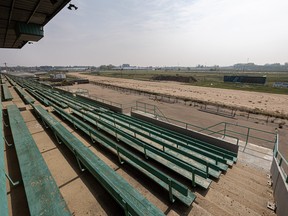Article content
After reading in the Saskatoon StarPhoenix in December that a Saskatchewan equine group (Saskatchewan Equine Sport and Agricultural Association) seeks control of Marquis Downs to re-establish horse racing in the city of Saskatoon, I felt compelled to voice my concerns.
When young horses are selected to go into racing, they are taken from their mothers and herd at a very young age, broken at around a year old and put into intense training at 18 months. Horses do not reach full musculoskeletal maturity until around the age of six, but rules permit racing at two years.
Article content
These social herd animals are kept alone in a stall for much of their racing careers. They may be sold or claimed several times, forcing them to adjust to many different handlers.
Add to that the stress of being transported about to various locations and races and it is no wonder that most racehorses have gastric ulcers.
A study conducted by Dr. F. J. Marqués and a team of researchers at the Western College of Veterinary Medicine at the University of Saskatchewan in Saskatoon studied horses that raced at Marquis Downs.
The researchers found that in spite of the short (three-month) racing season, the prevalence of gastric ulcers in thoroughbred horses in race training was 75 per cent. That is similar to the prevalence reported in other areas of the world, ranging from 60 per cent to more than 90 per cent.
Testing before and after races must be carried out to prevent unscrupulous owners from administering prohibited drugs to treat pain, mask symptoms and enhance performance with the goal of making more money.
When horses are whipped down a track at speeds that can exceed 60 km/h, they are at risk of serious injuries that may mean a premature end to their young lives, such as those resulting from collisions, catastrophic falls, internal hemorrhaging and musculoskeletal injuries.
Article content
Eight horses died in 2023 by Oct. 15 at Vancouver’s Hastings Racecourse. Imagine what an outcry there would be if eight professional human athletes died playing a sport over 10 months. In the last five racing seasons at Marquis Downs, 11 horses were put down and 36 were injured.
The horses that survive their short racing careers (around three years) are not all languishing in green pastures after retirement.
Some may be kept for breeding, some purchased for pets and some bought by kill buyers at auctions, then carted off to await slaughter at the Bouvry Exports Canada Ltd. facility in Fort McLeod, Alta., where these mighty steeds, who probably made their owners a tidy profit, are slaughtered and reduced to slabs of meat under cellophane.
I fear horse racing in Saskatoon will encourage breeders to churn out more horses and the rejected, injured and retired will create a feeder industry for the Bouvry slaughterhouse.
The equine association also wants to host other events involving horses, including chuckwagon racing. We hear about tragic accidents at chuckwagon races in Western Canada every summer.
Article content
According to statistics compiled by the Vancouver Humane Society, 75 horses have died in chuckwagon races at the Calgary Stampede since 1986.
Horse racing may have been traditional entertainment in the past, but not all traditions are good, including dog meat festivals, the annual dolphin slaughter off the Faroe Islands and bullfighting.
Surely Prairieland Park and the City of Saskatoon will agree upon a better use for this mothballed property.
Many children and adults could benefit from a stadium, concert hall, recreation centre, community gardens or numerous other possibilities rather than a place where adults sit around gambling on young horses forced into a high-risk sport and exploited for profit.
Margaret Henderson is an advocate for animal rights and a member of Animal Save Movement Saskatoon, a non-profit organization in Saskatoon that is part of a global network of activist groups that take action to stop animal exploitation.
Share this article in your social network





)






